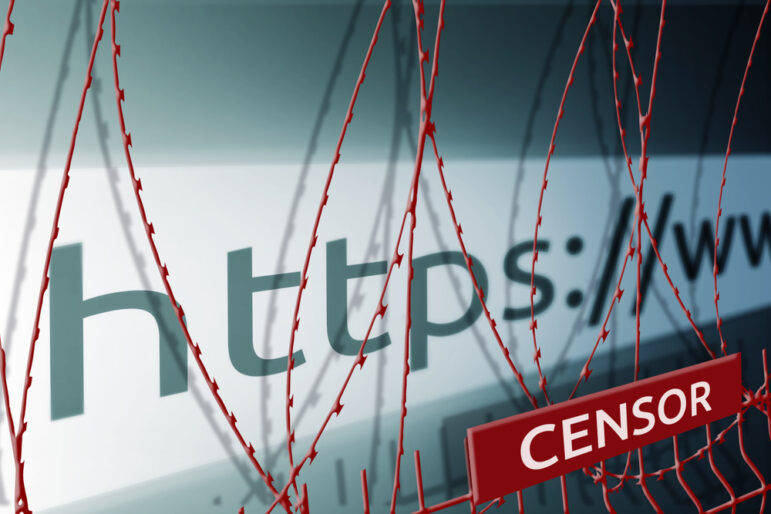
Image: Shutterstock
In honor of Sunshine Week — an initiative launched in 2005 by the American Society of News Editors to promote open government — the US National Press Club brought together a panel of experts to discuss the state of digital privacy and internet freedom. At this recent webinar, the group dug into privacy solutions and survival strategies for journalists who live and work inside authoritarian countries or are reporting on these locations from afar.
The conversation started with a recap of some troubling trends that were identified in the 2022 report on internet shutdowns by the digital rights watchdog group Access Now. In that report’s executive summary, it documented at least 187 shutdowns across 35 countries last year — breaking the single-year record for government usage of the internet kill switch.
“Authorities ordered shutdowns for many of the same reasons they have for years, some using the same tired justifications,” Access Now concluded. “In the midst of unrest and conflict, or just during yearly school examinations, governments, militaries, and police forces kept people in the dark as a desperate means of control. For prolonged periods of time, those in power used shutdowns to silence people, often targeting specific communities through complete blackouts, mobile shutdowns, and platform blocking.”
India, where press freedom has noticeably eroded of late, topped this list with 84 shutdown incidents in 2022. In war-torn countries such as Ukraine and Yemen, which ranked second and third, respectively, in the number of web blackouts last year, these shutdowns often coincided with human rights abuses and suspected war crimes.

The digital rights watchdog group Access Now documented at least 187 internet shutdowns in 2022. Image: Access Now
The Press Club’s panel of cybersecurity and internet experts was moderated by Rachel Oswald, a foreign policy reporter for CQ Roll Call who is on the Press Club’s press freedom team. She was joined by three panelists: Natalia Krapiva, tech-legal expert from Access Now, Ksenia Ermoshina, senior researcher at the University of Toronto’s Citizen Lab, and Nat Kretchun, senior vice president for programs at the Open Technology Fund, part of the taxpayer-funded US Agency for Global Media.
Common Internet Censorship Tactics
In general, Kretchun explained that web blackouts were driven by a few core motives when trying to control information and the press. He outlined the three main tactics of governments that seek to limit access to the internet.
1. Friction
This ranges from censorship of content to full-on shutdowns of internet service. A good example is the Iranian government’s web shutdowns during the 2022 protests, which have led journalists to find ways around Tehran’s interference and provide coverage from exile. Another way autocratic governments create friction — making it difficult for citizens or the media to access information — is throttling. This involves intentionally slowing down the bandwidth speed of a server, so that the internet users grow frustrated and give up.
2. Fear
Scaring citizens into avoiding certain websites or platforms for fear of punishment is another powerful way to encourage self-censorship among a country’s populace or press. One example: Belarus recently designated Telegram channels of some independent media as “extremist,” allowing charges to be brought against anyone who joined.
3. Flooding
Flooding involves the spreading of misinformation in large quantities to obscure or limit access to true information. It is censorship by adding data, rather than removing it. Usually, this is in the form of a deluge of counter-messaging from friendly, pro-government groups or organizations, as well as state-sponsored propaganda.
“We are seeing the normalization and further refinement of censorship tactics,” added Kretchun. He cited the total shutdown of the internet in Iran during the protests against the killing of Mahsa Amini in late 2022 as a show of “brute force,” with extended disruptions of mobile networks.
Kretchun stressed that it’s much easier to censor now than before. New, easy-to-use tools are being sold by some tech companies as “plug-and-play kits” for governments looking to crack down on dissent, silence independent media, and implement wide shutdowns.
Increased Use of Spyware and Surveillance Technology
As a troubling sign of this latter trend, Krapiva noted that vendors from both authoritarian and democratic countries are now selling surveillance tools to hostile actors. Some laws have been enacted that establish a level of responsibility for companies that sell spyware, she noted, but for the most part, these vendors go unregulated and rarely suffer consequences.
“Companies are still left to police themselves, regulate themselves,” Krapiva said. “What we have seen is that they don’t care, they don’t understand.”
Citizen Lab’s Ermoshina said that her research on these vendors shows them attending conferences across the Middle East and North Africa region, and more than willing to sell to authoritarian governments like Afghanistan and Kazakhstan.
“I’ve identified vendors that make packet inspection tools or phone interception devices. And they openly speak with governments like the Taliban about how good their solutions are,” Ermoshina said.
As for mobile service providers, Krapiva said that there have been instances where telecom and phone company providers have pushed back against governments by making public these regime’s requests to slow or block web traffic.
“Telcos do play an important role,” she said. “They have some way of resisting and providing some transparency.”
Krapiva added that citizens in some countries can apply pressure by taking these telecom companies to court.
Minority Communities Affected by Shutdowns
As an instructive case study, Ermoshina discussed her research in Crimea, and described the peninsula as a “laboratory for information control.” She explained how minority Muslim ethnic groups who live on the peninsula — who are typically pro-Ukrainian and oppose Russian occupation — have been censored within the region and had their access to outside, independent media cut off.
“We saw that these media were blocked heavily in Crimea,” she noted, even though these same sites may be accessible inside Russia.
Krapiva and Kretchun mentioned Kashmir, Tigray, Myanmar, West Papua, and Xinjiang as other examples of governments specifically targeting minority groups with internet shutdowns. The embattled region of Tigray has had its internet access blocked by the Ethiopian government for more than two years, according to Access Now.
New, Emerging Tools for Journalists
Although the challenges to internet freedom loom large, Krapiva stressed that, even as spyware tech is evolving, so is open source privacy software. There are benefits and risks to all tools, and she emphasized that no single one should be considered the solution.
For example, webinar moderator Oswald pointed to a recent announcement from WhatsApp owner Meta that could be a “really big deal.” She noted that the popular messaging service had added a feature that uses proxy servers from “volunteers” — whether individuals or organizations — that would allow users to bypass local web shutdowns. This move follows a similar step from Telegram, which recently started allowing the use of proxy servers to get around blocked connections and firewalls.
While proxy servers and virtual privacy networks (VPNs) can be useful weapons to get around localized firewalls and add a layer of protection, Krapiva also warned: “Proxies are not anonymity tools.” Using VPN servers and other circumvention tools that obscure your identity usually require trust in the provider to not be compromised. Encrypted platforms still have some vulnerabilities. WhatsApp, for instance, may protect the content of the messages but not the metadata, which is unsecured.
Kretchun encouraged users to find a variety of tools that complement one another, rather than relying on a single, seemingly secure application or platform: “We encourage folks to dive in. There are a lot more resources available now than before.” She also shared one recently developed tool that has been designed to circumvent censorship online.
This new alternative is CENO, short for “censorship.no” — a cooperative browser that allows access to the web and sharing of content across users in regions where connectivity is limited in some way. Ermoshina, who is helping out as a researcher on the project, explained that CENO is somewhat similar to the Tor browser and is “very different from a VPN.” It works by using BitTorrent technology protocols, she said, and “is very useful to deliver content of websites… and connect to blocked news media.”
CENO, which has seen its popularity spike in Iran and the Russian-occupied regions of Ukraine, even allows users to share cached versions of a banned story with other users. This kind of distributed sharing can be a vital method for watchdog reporters to stay in touch with their audience and keep their journalism in the public eye.
As Oswald noted at the conclusion of the webinar: “Open internet access is essential to the practice of journalism and a free press.”
You can watch the full webinar from the National Press Club below.
Additional Resources
Five Ways to Stay Online During a Government Internet Shutdown
‘Reporting from the Outside’: Lessons from Investigative Journalists in Exile
Document of the Day: Internet Freedom Faces Threats from ‘Authoritarian Overhaul’

Katarina Sabados is a Vancouver-based multimedia journalist currently covering supply chains at the Global Reporting Centre. Her reporting and research has appeared in NBC News, Canada’s National Observer, The Tyee, The Toronto Star, and OCCRP.
